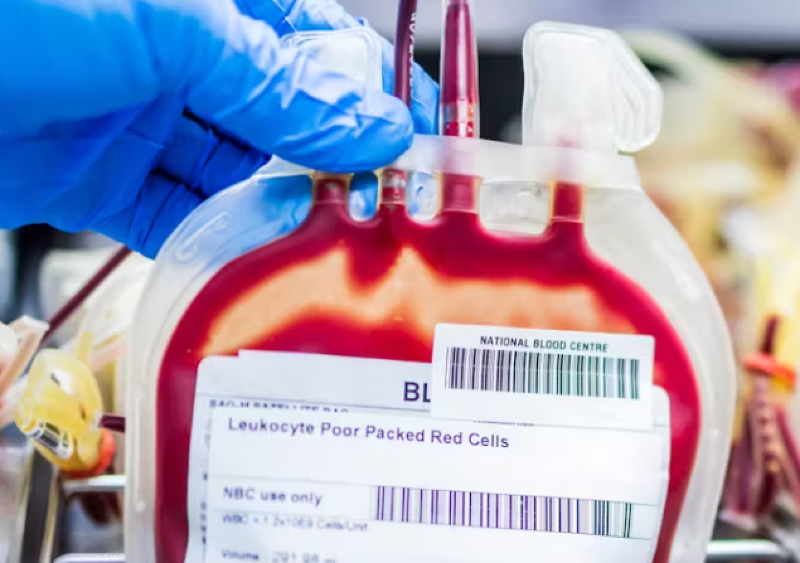Her blood type is the rarest that scientists have ever discovered

From The Conversation: "In a routine blood test that turned extraordinary, French scientists have identified the world’s newest and rarest blood group. The sole known carrier is a woman from Guadeloupe whose blood is so unique that doctors couldn’t find a single compatible donor. The discovery of the 48th recognised blood group, called “Gwada-negative”, began when the woman’s blood plasma reacted against every potential donor sample tested, including those from her own siblings. Consequently, it was impossible to find a suitable blood donor for her. Many people know their blood type – A, B, AB or O – along with whether they are Rh-positive or negative. But these familiar categories (those letters plus “positive” or “negative”) represent just two of several dozens of blood group systems that determine compatibility for transfusions. Each system reflects subtle but crucial differences in the proteins and sugars coating our red blood cells. To solve the mystery of the Guadeloupian woman’s incompatible blood, scientists used whole exome sequencing – a technique that examines all 20,000-plus human genes – they discovered a mutation in a gene called PIGZ."
Drug runners are using remote-controlled drone submarines with Internet connections

From Marine Insight: "The Colombian Navy announced the seizure of the country’s first unmanned narco-submarine equipped with a Starlink antenna on July 2, 2025. The vessel was found off Colombia’s Caribbean coast and is believed to be a test run for drug smuggling using remote-controlled technology. This marks the first known discovery of an autonomous narco-submarine in South American waters. Officials confirmed that the vessel was not carrying any drugs at the time of the seizure in April, but it was designed to carry up to 1.5 tons of cocaine and travel a distance of about 800 miles. According to the navy, the submarine belongs to the Gulf Clan, Colombia’s largest drug trafficking group. The submarine had two antennas, connected to a Starlink satellite modem for communication. It was also equipped with two surveillance cameras: one for navigating and the other for monitoring its engine."
Charles Dickens made fun of New Yorkers in 1842 for letting pigs roam in the streets

From Quartz: "On his first visit to America in 1842, Charles Dickens found plenty to ridicule — Americans’ obsession with money, their manners, their tobacco chewing. But the biggest target of Dickens’ humor was New Yorkers. Specifically, their pigs. Stepping onto Broadway, New York’s biggest commercial thoroughfare, Dickens encountered “two portly sows” and “a select party of half-a-dozen gentlemen hogs” among the brightly dressed ladies and a bustle of coaches. Even more than this strange sight of pigs roaming the city’s streets, Dickens was captivated by the free and easy swine lifestyle—a “roving, gentlemanly, vagabond kind of life.” Scavenging curbside trash in droves, New York’s wandering pigs were on “equal, if not superior footing” with humans—a model of self-sufficiency. Though it’s hard to know exact numbers because no one was counting, during pig-ownership’s peak years, in the early 1820s, some 20,000 hogs roamed the streets of Manhattan, says professor Catherine McNeur."
Hi everyone! Mathew Ingram here. I am able to continue writing this newsletter in part because of your financial help and support, which you can do either through my Patreon or by upgrading your subscription to a monthly contribution. I enjoy gathering all of these links and sharing them with you, but it does take time, and your support makes it possible for me to do that. I also write a weekly newsletter of technology analysis called The Torment Nexus.
A finding in the Arctic could push the formation of Earth’s crust back by 130 million years

From Nautilus: "In a publication this summer, together with colleagues, Rizo, a scientist at Carleton University in Ottawa, described rocks at one study site, the Nuvvuagittuq Greenstone Belt, as dating to 4.16 billion years ago, making them some of the oldest rocks ever collected on Earth, possibly the oldest ever to have formed on the planet. On a geological time scale the formation of the first or the oldest rock marks the end of the so-called Hadean period, Rizo says. At the moment, this boundary is set by rocks found at the Acasta Gneiss Complex in Yellowknife Canada, which date to 4.05 billion years ago. But the new rocks are clearly older than that, Rizo says. The finding pushes the timeline for the formation of Earth’s first crust back by 130 million years. It also accelerates the timeframe for how quickly life may have emerged after the Earth formed, which Rizo hopes to study next in collaboration with paleobiologists who will look for microfossils of cells in the area."
There's a store the size of a city block in Alabama that just sells unclaimed luggage

From The Cut: "If it’s any consolation, those headphones you left in the seat-back pocket did not just vanish into some unknowable void of lost things. Most likely, they made their way to Unclaimed Baggage, a store that occupies a full city block in Scottsboro, Alabama, where six days a week, 7,000 items, salvaged almost entirely from lost luggage, are set out for sale. The result is a democratic and dissonant array of merchandise: everything from used underwear (size XS to XXXXXL) for 99 cents to a gallon-size Ziploc of loose Band-Aids ($13) to a $28,000 Rolex flashing with enough diamonds to pose a seizure risk.Most major airlines send their baggage to the store, as do bus lines, resorts, casinos, rental-car agencies, and pretty much any corner of the travel sector where customers leave things behind. These companies will generally hold your lost stuff for 90 days, waiting for you to reclaim it. On day 91, orphaned goods may be picked up by Unclaimed Baggage’s lone freight hauler, whose life is apparently an unceasing schlep between America’s transport hubs and Scottsboro, a town of 15,000 greenly notched in the Appalachian foothills in the northeastern corner of the state."
Schoolkids play Ozzy Osbourne's song Crazy Train on dozens of xylophones

Acknowledgements: I find a lot of these links myself, but I also get some from other newsletters that I rely on as "serendipity engines," such as The Morning News from Rosecrans Baldwin and Andrew Womack, Jodi Ettenberg's Curious About Everything, Dan Lewis's Now I Know, Robert Cottrell and Caroline Crampton's The Browser, Clive Thompson's Linkfest, Noah Brier and Colin Nagy's Why Is This Interesting, Maria Popova's The Marginalian, Sheehan Quirke AKA The Cultural Tutor, the Smithsonian magazine, and JSTOR Daily. If you come across something interesting that you think should be included here, please feel free to email me at mathew @ mathewingram dot com



